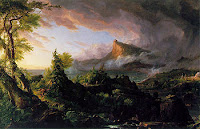FELLOW ARTISTS
INSPIRED BY THOMAS COLE'S
"THE COURSE OF EMPIRE"
NELL SHAW COHEN

INSPIRED BY THOMAS COLE'S
"THE COURSE OF EMPIRE"
NELL SHAW COHEN
Brooklyn based Nell Shaw Cohen made five compositions based on "The Course of Empire".
Under the same title, and composed in 2008, each composition lasts a few minutes each.
The first composition "The Savage State" is based on the Medieval motets done in chanting.
It is a moody piece with a wavering tone symbolising in my opinion the stirring of nature.
With higher melody rising in tone as the bass tone does, suggest certain natural phenomena.
The dawning of the sun, the stirring of the clouds of the storm being pushed aside by said sun.
There is the movement of limbs of trees by birds perching, or of flowers bobbing in the wind.
Other images it conjures up is a deer raising its head from where it has been grazing to look.
The wavering tone also suggests the stealthiness of the hunter attempting to hunt said deer.
The piece is altogether quite moody, emotional, oscillating between melancholy and sanguine.
The second composition "The Arcadian or Pastoral State" is based on Renaissance dance music.
The course eases into another wavering but in this case a much higher more lively tune.
It suggests the melodic dancing of people in a happy state, such as the women in the painting.
It also suggests a carefree and sense of harmony with nature, like the young boy drawing.
It suggests an agreeableness with nature and genuinely positive attitude towards the day.
The music suits the painting very much in that is shows a pleasant although not stale approach.
The constant wavering of the tune up and down suggests the range of emotions.
Like birds bobbing on branches, or trees wavering in the winds, or sheep moving in herds.
It could accompany the house with its rising smoke or the man ploughing his field.
The sunny disposition of the dance music also suggests the sunniness of the weather as well.
The third composition "The Consummation of Empire" is based on Baroque Orchestral music.
This is much more seriousness, seeming to launch into a richly orchestral classical piece.
The piece seems almost intrusive, as if this music is being pushed in front of the piece.
This to me suggests almost a ceremonial moment following a procession of a king or priest.
The musical overlays suggest a sense of dance, a presence of authority and high culture.
The more classical notes seem to also capture the serious yet still festive notions of the people.
However with this festiveness and ceremony, there is still a dark underlying current in this piece.
To me it much suggests the procession on the causeway in Cole's painting and its audience.
The fourth composition "Destruction" is what Cohen calls "Bartok meets Led Zeppelin".
This piece also charges forward, but is much more chaotic, repetitive and rising in tension.
It suggests an almost frenetic pace of change, like the stirring up of storms and fire.
The piece then surges forward suggesting the ambush of violence and chaos by the attackers.
There is also a melancholic moodiness suggesting a sense of woe and overall sadness.
The world of high culture comes to an end as the piece settles onto what appears an end.
But this is only the eye of the storm, and again the music surges and swells up into being.
These risings and falling out of notes and volume suggest the aftermath effects of it all.
Like ripples in a pond or the struggling of a drowning person trying to reach the surface.
Only for silence to finally fall upon the drowner and we come to the end with a great quiet.
The fifth composition "Desolation" is based on contemporary ahistorical, abstract music.
Seeping in from the quiet the piece is overall moody and almost creepy in its appearance.
Like a long mist or darkness creeping in with a wavering tone suggesting nature again.
The notes stretch on in as the moodiness does not let up, suggesting the spread of night.
The wavering moodiness is again to suggest nature fully taking control of the landscape.
There is some light moments where it appears the highs and lows of experience are felt.
The piece then lowers and becomes more simple, suggesting perhaps almost a requiem.
This is a piece that seems lonely and still stirring into being as it comes with society's end.
There is again a darkness with the moodiness, almost a muddling of feelings at low notes.
The notes however do stretch in long melodic notes net not harmonic almost medieval again.
Like the medieval motets, yet intersperced with what may be leftovers of previous eras.
Until it is all finally winding down and easing into another segue into silence and darkness.
In all, Nell Shaw Cohen's work captures the mood and atmosphere of the paintings.
She almost tries to make it seem like she has represented its lighting and form of weather.
In a sense she is an artist with great variety in her sources and inspirations for her works.
I wonder personally what it would be like if Nell Shaw Cohen and Mr Hunter met one day.
I have tried to contact Nell Shaw Cohen regarding this blog/novel.
I have not yet been able to receive a reply from her, probably due to randomness of email.
In order to permit others to find out about her work, please go to the following page:
http://nellshawcohen.com/index.html
Her five compositions based on "The Course of Empire" by Thomas Cole is on this page:
http://nellshawcohen.com/music_chamber.html#empire
There is also information regarding the notes based on her compositions on this page:
http://beyondthenotes.org/artmusic/empire/




